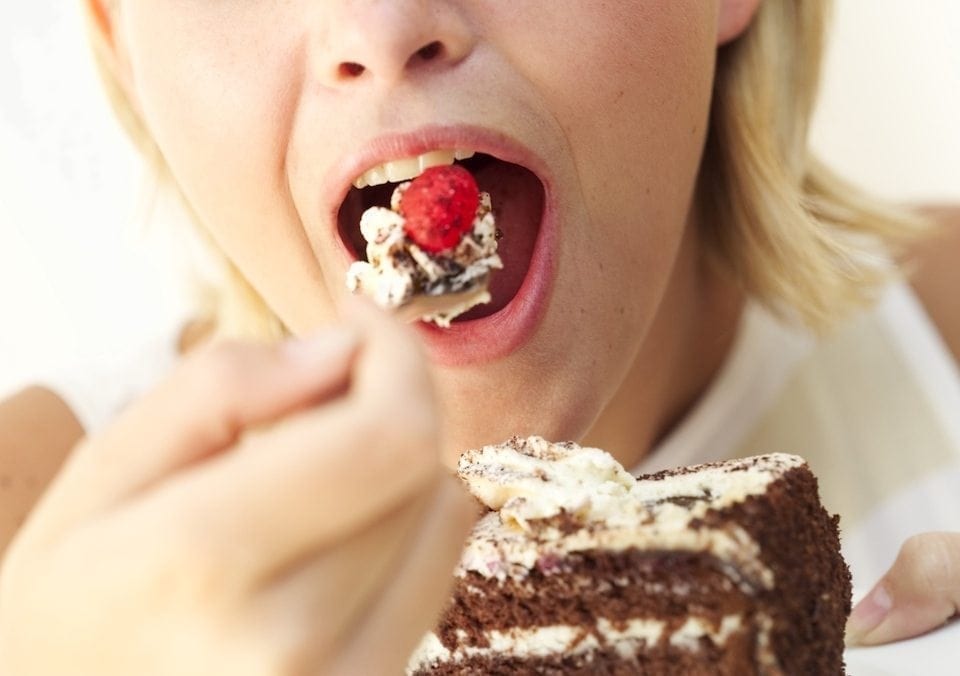Some are addicted to sex, others need their rock and roll fix, but what about food addiction? One new University of Luxembourg study says that in fact, it exists. “Some people have an instinctive, psychological predisposition to binge eating,” says University of Luxembourg researcher Claus Voegele, Professor of Clinical Health.
Voegele was also quick to point out that “People may overeat to comfort themselves, because they are bored or just out of habit.” We’re sure that rings true. Ever order dessert when you’re already full from dinner? Yes. Binge eat ice cream after you lost a job or broke up with a boyfriend? Yep. And who among us hasn’t been bored, watching TV and decided a bag of chips was just the thing to help pass the time?
Dr. Pamela Peeke devoted an entire book, The Hunger Fix, to the concept of food addiction. According to Peeke, food addiction is very real and dopamine rushes in the body can work exactly the same way with food, as with drugs like cocaine. Worried you may be addicted to food? Dr. Peeke comes to the rescue with her 3 pillars to combat food addiction:
Pillar #1: The Mind “In any addictive process, you have injured and are impairing the ‘smarty pants’ part of the brain (prefrontal cortex). When this happens, you end up having to heal it.” Dr. Peeke’s suggestion for the healing process is transcendental meditation, which will make you more aware and more mindful. “In order to repair the damage, you need to eat mindfully and be present, focused and attentive so you can reign in your impulsivity.” At the root of reaching (or not) for those chips? Impulse control! Spend more time on your yoga mat or in a quiet room, being present, listening to your breath, to better control those unhealthy eating impulses.
Pillar #2: The Mouth Here’s where we can all get into trouble. The first question to ask yourself: What have you put into your mouth already today and why? “Your first goal is to go to battle, to ‘duke it out’ with your false fixes and replace them with something so delicious, so satisfying, that you don’t even care about your false fix anymore.” Dr. Peeke points out that one of the biggest mistakes people make in trying to change their false fixes is going from eating a chocolate candy bar everyday to a plate of arugula. Mistake! Instead, create healthy sweet/fat meals with equal parts fiber and protein. Dr. Peeke’s top choices? Peanut butter and apples, hummus with carrots, cottage cheese and peaches, or any number of smoothie combos with whey protein, greek yogurt, and fruit.
Pillar #3: The Body So you don’t have to don a leotard and sweatband but you do need to move. Again, Dr. Peeke cautions against making any drastic changes: “The worst thing anyone [who is just starting to make healthier fitness changes] can do is sign up for a CrossFit class! Keep it simple. Make it joyful! The “simple,” per Peeke’s suggestion, can be taking a brisk walk and incorporating a few intervals. The “joyful?” Finally signing up for that Zumba class, playing ball with your kids, or taking a walk in the park with your bestie (human or furry). The most important thing is to be consistent and those “false fixes” don’t stand a chance!
More great articles from Fitbie:
- Cheap Junk Food May Be to Blame for Rising Obesity Rates
- 4 Healthy Hacks to Restaurant Eating
- The Unsettling Truth About Fruits, Veggies, and Weight Loss





2 Responses
I don’t need a University study to convince me – I’ve lived with food addiction. The most important thing that I’ve done to combat it is to rid my body of processed sugars. When I have sugar in my system, I truly cannot control my eating habits and continually binge (on not just sugar, but other junk, too) to maintain the “high.” After about 4 days to a week of no sugar, I am able to control my eating and make reasonable food choices. Control is the key word. I completely lose control when I’m “infected” with the sugar. Note: Once in control, I am able to allow myself natural sugars, such as honey, maple syrup, and sorghum, as well as limited bread that contains sugar, in moderation without losing control again.
Sugar. Sugar is my addiction. They’ve done numerous studies that show it lights up the brain just like cocaine does. The only way I can control it (not win against it–once an addict, always an addict) is to eat an extremely low carb diet. Carbs, even healthy carbs (fruits, vegetables, starches), trigger the addiction, and I find myself bingeing on actual sugar (candy, ice cream, etc.) to the point of illness. I call those moments my sugar benders. I have to live on proteins and fats, and try to keep the carbs to less than 10gm per day because I know the body still needs them, but not many, and certainly not as much as the food pyramid would have you eat. I get the carbs from eggs, heavy cream and whey protein, and occasionally allow a few from condiments such as homemade ketchup (which I make sugar-free), barbecue sauce, and store-bought mayo. Occasionally I allow myself a “treat” of a few onions or mushrooms, and maybe some peppers and fresh garlic, but only as a flavoring. I can’t eat a full serving without triggering the sugar/carb addiction. I have to take a fistful of supplements to make sure I’m getting the vitamins and minerals I obviously can’t get from my diet. It’s not a fun way to live, but I feel healthier.